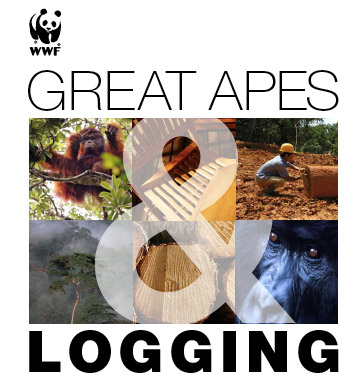Promoting reduced impact logging in forest areas already under concession could help protect populations of endangered great apes, argues a new report published by WWF.
Analyzing scientific studies on the consequences of different types of logging on great apes, Arnold van Kreveld and Ingrid Roerhorst found that logging concessions certified by the Forest Stewardship Council (FSC), an environmental standard for forestry operations, can serve as useful supplements to existing protected areas that support great ape populations. They further found that “responsibly managed” forests can form habitat corridors between primate habitats.
 Gorilla in Gabon. Photo by Rhett A. Butler |
“In contrast to other forms of logging, FSC certified logging offers increased assurance that the appropriate habitat for great apes will be maintained,” the authors write. “The western gorillas and Bornean orang-utans in particular can be found in high densities in well managed FSC certified concessions. Chimpanzees and Sumatran orang-utans seem to be more sensitive to human activities, even though they appear to be able to survive well in selectively logged concessions with low hunting pressure.”
Van Kreveld and Roerhorst note that FSC-certification combines selective logging with other safeguards, including closing off roads to the public and protecting selected fruit trees species. Additionally, FSC-logging operations are third-party audited to ensure compliance.
But while there are clear benefits of reduced impact logging to ape populations relative to conventional logging techniques, “most logging concessions that occur in great apes habitats are not FSC certified,” the authors report.
“The FSC certified area in South East Asia is virtually negligible, but growing. In the Congo Basin there are various large FSC logging concessions (together 4.5 million hectares) housing healthy populations of gorillas as well as chimpanzees. They represent only a small part of all concessions,” in most countries, less than 10 percent, according to the authors.
Van Kreveld and Roerhorst conclude that wider adoption of FSC standards would help preserve great ape habitats while reducing the overall environmental impact of logging operations. Such benefits would include reduced greenhouse gas emissions, faster forest recovery, and greater retention of biodiversity and ecosystem services relative to conventional logging.
 Sumatra, 2009 |
The authors call for greater support of FSC-certification in consumer and producer countries. Van Kreveld and Roerhorst say consumer countries should give preference to FSC products, while producer countries should promote the scheme through “active” law enforcement (such as cracking down on poaching) and by providing assurances that “FSC certified forests will continue to be responsibly (FSC) managed in the long term.”
WWF, along with most other large conservation organizations, has long been an supporter of FSC-certification. Some environmental groups do not support the initiative, arguing that its safeguards do not go far enough to reduce detrimental impacts on forests or mitigate social conflicts between companies and forest communities. FSC’s certification of single-species plantations has also proved controversial in some circles.
GREAT APES & LOGING

Forest certification system needs reform to ensure sustainability – report
(11/04/2008) Demand for wood products is ultimately one of the largest drivers of global deforestation through both direct clear-cutting and selective logging, which increases a forest’s vulnerability to fire and subsequent clearing and disturbance by other actors, including hunters, subsistence farmers, land speculators, ranchers and agro-industrial firms. Reducing the detrimental environmental impacts of meeting wood demand is critical to protecting the world’s forests as healthy, productive and resilient ecosystems.
Rainforest Action Network to review support for FSC certification
(10/16/2008) The Rainforest Action Network (RAN) said it would review its support for the Forest Stewardship Council (FSC), a forest products certification standard, over concerns regarding its certification of destructive logging operations. The announcement comes after a bitter campaign waged against RAN by Ecological Internet, a forest activist group.
The FSC is the ‘Enron of forestry’ says rainforest activist

(04/17/2008) On April 7th, Mongabay printed an interview with FSC International Communications Manager, Nina Haase, in which she defended the FSC against criticism leveled at it by various environmental organizations, such as The World Rainforest Movement and Ecological Internet. The interview drew strong reactions on both sides, and Simon Counsell, director of the Rainforest Foundation UK, requested a chance to respond to the FSC’s interview in-depth. In his response, he states that the FSC has created a “‘race to the bottom’ of certification standards”, alleging that the “FSC really has become the ‘Enron of forestry'”.
The FSC responds to its critics

(04/07/2008) Last month, Mongabay.com reported on recent and various criticisms of the FSC (the Forest Stewardship Council). The FSC is an international organization that certifies forest products which, according to their standards, have been harvested in an environmentally-sustainable and socially-responsible manner. Response to the article was significant. It was picked up by the Ecological Internet’s email campaign and was mentioned on numerous environmental web sites and blogs. At the time of the publication, the FSC had not responded to requests for comments. But in the following interview, FSC International Communications Manager Nina Haase answers each criticism separately and addresses several other issues, such as the FSC and climate change, the organization’s monitoring capabilities, and its adaptation to new environmental concerns. Ultimately she responds to the big question raised by critics: is the FSC stamp still credible?